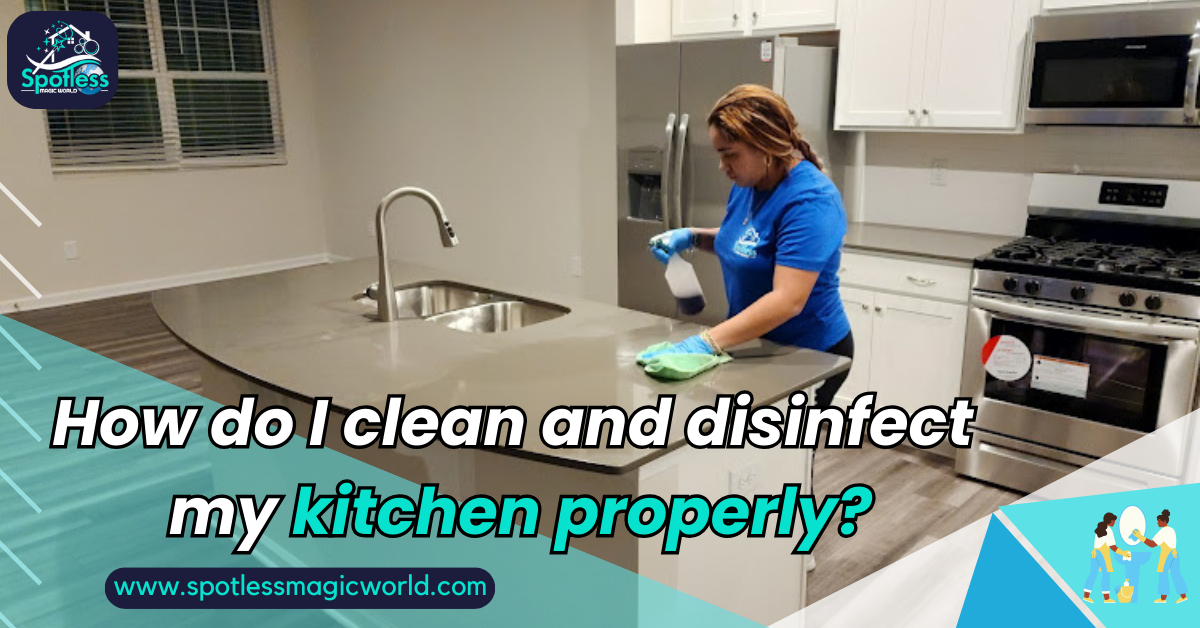Licensed And Insured

How Do I Clean and Disinfect My Kitchen Properly Using Kitchen Cleaning Service?
Keeping your kitchen clean and disinfected is essential for maintaining a healthy and hygienic environment because this is where you will do the most precious thing – cooking for yourself and your family. While cleaning the kitchen may seem like a straightforward task, it is essential to follow specific steps to ensure that you are doing it right.
Whether you are a homeowner or looking to start a kitchen cleaning service, understanding the proper techniques for cleaning and disinfecting your kitchen can go a long way in preventing the spread of harmful bacteria and viruses.
In this article, we will guide you through the step-by-step process of cleaning and disinfecting your kitchen properly. We will cover everything from basic kitchen cleaning tips to advanced techniques that are commonly used by professional kitchen cleaners.
If you wish to hire professional kitchen cleaning services, this article will provide you with the necessary knowledge and expertise to get started.
Why Is It Important to Clean and Disinfect Your Kitchen?
Our kitchens are the most frequently used areas in our homes, and they are also the places where we prepare and store food. This makes it critically important to clean and disinfect them regularly.
When it comes to cleaning your kitchen, it’s not just about removing visible dirt and grime. You need to focus on both cleaning and sanitizing to remove harmful germs and bacteria that can cause serious illness and disease. Proper cleaning and sanitization can help prevent the spread of foodborne illnesses, such as salmonella and E. coli.
What Are the Different Types of Germs That Can Live In Your Kitchen?
Various germs can thrive in your kitchen, including bacteria, viruses, and fungi. Some of the most common types of bacteria found in kitchens include Salmonella, Listeria, and E. coli. These bacteria can cause tummy aches to severe infections, leading to major illness to death.
Viruses like Norovirus and Hepatitis A are more likely to be present on kitchen surfaces if proper hygiene and sanitation practices are not followed. These viruses can be transmitted through contaminated food or contact with contaminated surfaces.
Fungi, such as mold and yeast, can grow on food and in damp areas of the kitchen, such as around the sink and dishwasher. The spores from these organisms can cause allergies and respiratory problems.
How Can You Prevent the Spread of Germs in Your Kitchen?
Preventing the spread of germs in your kitchen starts with regular cleaning and disinfection. To effectively clean and sanitize your kitchen, you should use products that are EPA-registered for use as a disinfectant. You can also make a simple disinfectant solution using bleach per gallon of water.
When cleaning your kitchen, you should focus on high-touch surfaces, such as countertops, handles, and appliances. You can use either spray or wipe methods depending on the surface being cleaned.
If you find it challenging to keep your kitchen clean or are unable to devote the necessary time and effort to deep clean and sanitize your kitchen, consider hiring a professional kitchen cleaning service to get the job done for you.
Step-by-Step Guide to Cleaning and Disinfecting Your Kitchen
Maintaining a clean and bacteria-free kitchen is essential for preventing the spread of viruses and diseases. Keeping your kitchen clean can be an exhausting task, but following these simple steps will help you ensure that your kitchen is always spotless.
Part 1: Cleaning
-
Wipe down all surfaces with a damp cloth and mild soap.
The first step in cleaning your kitchen is wiping down all the surfaces with a damp cloth and mild soap. This includes countertops, tables, chairs, and other surfaces. Make sure to remove any crumbs or debris before wiping them down. It will help prevent the accumulation of bacteria and viruses on these surfaces.
-
Clean appliances with a damp cloth and mild soap.
After cleaning the surfaces, move on to cleaning the appliances in your kitchen. Use a cloth, mild soap, and water to clean the exterior of your dishwasher, oven, and microwave. This will help remove any grime or food stains that have accumulated on them.
-
Disassemble and clean small appliances (blenders and toasters).
Small appliances like blenders and toasters also need to be cleaned regularly. Disassemble them and clean each part individually with warm water and soap. Make sure to dry them thoroughly before reassembling them.
-
Clean out the refrigerator and freezer.
Cleaning out your refrigerator and freezer is an important step in maintaining a clean kitchen. Remove all the items from the fridge and wipe down the shelves and drawers with a damp cloth and mild soap. Throw away any expired food items and organize the remaining ones.
Part 2: Disinfecting
-
Use diluted bleach solutions to disinfect surfaces.
Bleach is an effective disinfectant that can quickly kill germs on surfaces. Mix one tablespoon of bleach with hot water in a gallon-sized container. Wipe down all high-touch surfaces in your kitchen, including countertops, light switches, and doorknobs.
Be sure to let the solution sit on the surface for at least five minutes before wiping it off with a clean cloth.
-
Use a commercial sanitizer to disinfect surfaces.
Commercial sanitizers are also effective in killing germs on surfaces. Make sure to use a product that is approved by the Environmental Protection Agency (EPA) and follow the instructions on the label carefully.
Spray or wipe the sanitizer on high-touch surfaces in your kitchen and let it sit for the recommended time period before wiping it off with a clean cloth.
-
Wipe down all surfaces with a clean cloth.
Regularly wiping down all surfaces in your kitchen with a clean cloth can help keep them free of germs and bacteria. Use hot water and soap to clean surfaces before applying a disinfectant.
When wiping down surfaces, make sure to focus on high-touch areas like countertops, light switches, and doorknobs.
Tips for Cleaning and Disinfecting Your Kitchen
The kitchen is one of the most important areas in your home that requires regular cleaning and disinfecting. Here are some tips to ensure your kitchen is clean and free from harmful germs.
-
Clean and disinfect your kitchen regularly, especially after cooking.
The kitchen is a space where food is prepared, cooked, and stored. It’s crucial to keep it clean and hygienic at all times, especially after cooking. Regular cleaning can eradicate the colonization of bacteria and other harmful microorganisms.
Use a cleaning solution that is effective in killing germs and viruses. Pay special attention to high-touch areas like countertops, sinks, refrigerator handles, and stove knobs.
Moreover, the CDC recommends air drying your cutting board thoroughly after washing it with hot, soapy water is an effective way to remove any remaining moisture and reduce the risk of contamination.
-
Use separate cloths for cleaning and disinfecting.
Cross-contamination is a major concern when it comes to cleaning and disinfecting your kitchen. Using the same cloth for both tasks can transfer bacteria and germs from one surface to another, increasing the risk of infection.
To avoid this, use separate cloths for cleaning and disinfecting. Color-coding the clothes can help you remember which cloth is used for what task.
-
Rinse all surfaces thoroughly after cleaning and disinfecting.
After cleaning and disinfecting your kitchen, rinse all surfaces thoroughly with water. This will help remove any residue the cleaning solution might leave behind.. Residues can attract dirt and dust, leading to unsanitary conditions.
Make sure to dry the surfaces completely to prevent the growth of mold and mildew.
-
Dispose of cleaning cloths and wipes properly.
Dispose of used cleaning cloths and wipes properly to prevent the spread of germs. Do not reuse or leave them lying around on kitchen surfaces. After use, place them in a plastic bag and tie them securely before disposing of them in the trash.
If you don’t have time to clean your kitchen yourself, consider hiring a professional kitchen cleaning service. They have the expertise and equipment to ensure that your kitchen is thoroughly cleaned and disinfected, giving you peace of mind knowing that your family’s health is protected.
Key Takeaways
Ensuring a clean and disinfected kitchen is essential for maintaining a healthy living environment. It’s best to always pay attention to high-touch surfaces such as countertops, appliances, and handles to prevent the spread of germs and bacteria.
If you are looking for professional and efficient cleaning services in Greenville, SC, Spotless Magic World LLC offers excellent kitchen cleaning services. Our team of trained professionals uses state-of-the-art equipment and cleaning products to ensure that your kitchen is spotless and hygienic.
With Spotless Magic World, you can rest assured that your kitchen is always clean and disinfected, giving you peace of mind and a healthy living environment.



